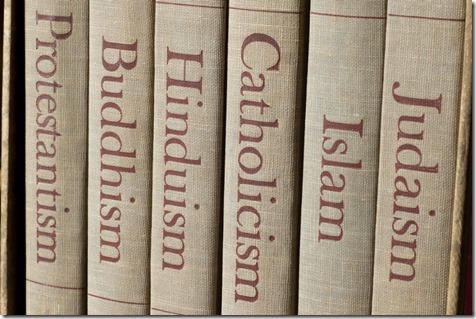
Why “Christianity,” “Judaism,” and “Islam” are Misnomers
 I was sitting in my office the other day gazing rather absent-mindedly at my library when my eye caught a book I hadn’t looked at in a while: Handbook of Denominations in the United States.
I was sitting in my office the other day gazing rather absent-mindedly at my library when my eye caught a book I hadn’t looked at in a while: Handbook of Denominations in the United States.
I had to get this book in seminary for a church history class. Back then it was 320 pages long and described 225 religious groups in America. The vast majority, of course, are Christian denominations, because this is America.
I loaned that copy to someone years ago and never got it back, so I ordered the latest edition at the time. It had 400 pages and described 248 groups.
The most current edition, published in 2015, has 432 pages and covers over 250. It describes 222 Christian denominations or groups alone.
There are 29 Baptist denominations, and 10 other Catholic groups in addition to the Roman Catholic Church.
That’s a lot of Christian denominations. And that’s just in the United States.
It really isn’t proper to consider Christianity some monolithic entity with one singular belief system. It just isn’t so.
For someone outside of Christianity to say that all Christians believe this or do that reveals a superficial understanding of the vast diversity of Christianity.
In fact, it’s not really right to talk of Christianity, but of Christianities.
The same is true of biblical Judaism. There were many different religious groups among the Jews, some of them rival groups. Perhaps you’ve heard of the Maccabean Revolt, which occurred in 167-160v B.C.E. It is the setting of the Jewish festival of Hanukkah.
The standard view of this revolt, is that it was a Jewish rebellion against the Seleucid Empire which controlled them. It was incited by Antiochus IV Epiphane’s attempt at imposing Greek culture on Judea and ridding it of its Jewish culture, institutions, and religion.
This view mainly comes from the four books of Maccabees, which were obviously written to shine the most favorable light on the leader of the revolt, Judas Maccabee, and his family.
A growing scholarly consensus now believes that Antiochus actually was just inserting himself into a civil war between traditionalists and reformists Jews, the latter of which favored the Hellenization of Judea.
It seems that the traditionalists were persecuted for trying to keep to the old ways by circumcising their children and refusing to eat pork. Antiochus sided with the Hellenist Jews in fighting against the traditionalists.
So Jewish religion even that far back had different, competing forms, and still does. While it may be proper to speak of a singular ethnic group called Jews, there is a lack of complete uniformity in their religion.
There is a lot of talk currently about Muslims and the religion of Islam. Much of it reflects this same fundamental misunderstanding.
There are billions of Muslims spread across the world, and neither the cultures they live in nor the religion they practice are monolithic. To speak of what Muslims believe or what Islam teaches reveals every bit as superficial an understanding of Islam as assuming that all Christian believe the same doctrines and observe the same practices.
I don’t want my own faith lumped in with those who hold signs saying “God hates fags” or with those church-going folk who burned crosses in the front yards of southern blacks and attended lynchings.
Likewise, there are plenty of Muslims who don’t want their faith lumped together with those Muslims who practice terrorism in the name of Islam. It’s not an Islam that they recognize, that they practice, or that they want to be associated with.
It’s not just superficial thinking that treats religions like Christianity, Judaism, or Islam as monolithic. It’s simplistic thinking. This is a complex world, and it’s tempting to try to simplify it in ways that we can understand.
But sometimes you just have to deal with the complexity and the ambiguity that results.
Simplistic thinking in a complex world is dangerous.
Such simplistic thinking leads to war.
It leads to great evil.
In a world in which there are multiple ways of killing lots of people in one fell swoop, we can’t afford such simplistic thinking.
Photo by © Can Stock Photo / markskalny
 I am a lifelong student of the Bible, and have been a pastor for over twenty-five years. My desire through this blog is to help people see things in the intersection of Scripture and real life that they might have missed. The careless handling of the Bible is causing a lot of problems in our churches and our culture--and is literally turning people away from the church, and, sometimes, God. I hope to treat Scripture with the respect it deserves, and, even if you don't agree with what I say, give you some insight.
Feel free to leave a comment. I promise to respond to you. All I ask is that you be respectful in your comments.
I am a lifelong student of the Bible, and have been a pastor for over twenty-five years. My desire through this blog is to help people see things in the intersection of Scripture and real life that they might have missed. The careless handling of the Bible is causing a lot of problems in our churches and our culture--and is literally turning people away from the church, and, sometimes, God. I hope to treat Scripture with the respect it deserves, and, even if you don't agree with what I say, give you some insight.
Feel free to leave a comment. I promise to respond to you. All I ask is that you be respectful in your comments. 
Connect with Me